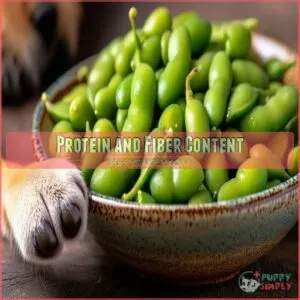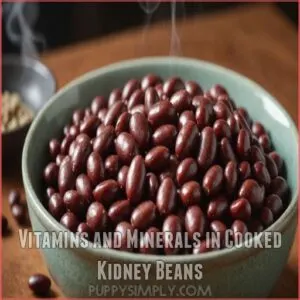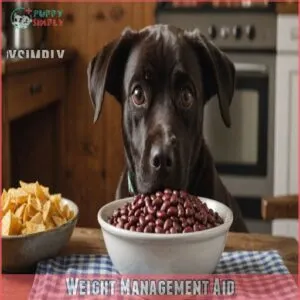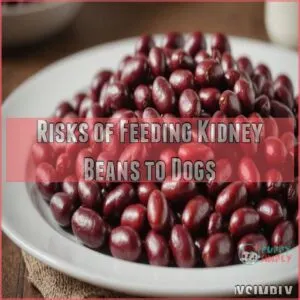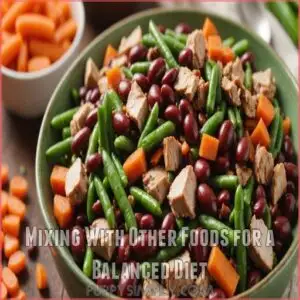This site is supported by our readers. We may earn a commission, at no cost to you, if you purchase through links.
 You can feed your dog cooked kidney beans as part of a balanced diet, offering a healthy dose of protein, fiber, and antioxidants.
You can feed your dog cooked kidney beans as part of a balanced diet, offering a healthy dose of protein, fiber, and antioxidants.
They’re great for canine health, but moderation is key.
While dogs can’t enjoy raw kidney beans due to potential toxicity, cooked ones are safe.
Remember, too much of a good thing might lead to digestive issues, so don’t overdo it.
Some dogs might turn up their noses at the beans’ texture, but mixing them with other favorites could do the trick.
Curious how else kidney beans can fit into your dog’s menu?
Explore the possibilities ahead!
Table Of Contents
- Key Takeaways
- Can Dogs Eat Cooked Kidney Beans
- Health Benefits of Cooked Kidney Beans for Dogs
- Risks of Feeding Kidney Beans to Dogs
- Incorporating Cooked Kidney Beans Into a Dog’s Diet
- Consulting a Veterinarian About Cooked Kidney Beans
- Frequently Asked Questions (FAQs)
- Can dogs eat kidney beans?
- Can dogs eat beans?
- Can dogs eat garbanzo beans?
- Can dogs eat canned red beans?
- Can dogs eat cooked canned kidney beans?
- What beans can dogs not eat?
- How to cook red kidney beans for dogs?
- Are canned red kidney beans cooked?
- Kidney beans: safe for puppies?
- What about raw kidney beans?
- Can dogs eat kidney bean soup?
- How many beans are too many?
- Best way to cook beans for dogs?
- Conclusion
Key Takeaways
- You can safely feed your dog cooked kidney beans, which should be soaked and cooked thoroughly before serving to avoid digestive issues, as explained in the guide to beans for dogs. You can safely feed your dog cooked kidney beans, offering them protein, fiber, and essential vitamins.
- Only serve them cooked and plain; avoid raw beans or added seasonings, which can be harmful.
- Start with small portions and monitor your dog’s digestive response to prevent any stomach issues.
- Consulting your vet ensures kidney beans fit well into your dog’s balanced diet and meet their nutritional needs.
Can Dogs Eat Cooked Kidney Beans
So, you’re wondering if your furry friend can enjoy some cooked kidney beans?
Let’s explore the nutritional value, safe preparation methods, and appropriate serving sizes to make sure your dog enjoys this treat responsibly.
Nutritional Value of Cooked Kidney Beans
Cooked kidney beans pack a punch in terms of nutrition for your dog.
They’re loaded with protein, fiber, and a host of vitamins and minerals.
Protein helps muscle growth; fiber aids digestion.
Plus, these beans bring important nutrients like iron and magnesium.
So, yes, dogs can eat cooked beans, gaining from these kidney bean benefits for canine nutrition and digestion.
Preparing Cooked Kidney Beans for Dogs
To prepare kidney beans for your dog, start with proper cooking to make sure safety.
First, soak the beans overnight to reduce toxins, then boil until soft.
Skip the seasoning like salt, onions, or garlic, which can harm dogs.
Make sure thorough cooking to avoid digestive issues.
Clean water and simple preparation make kidney beans a safe treat for your pup.
Safe Consumption Amount for Dogs
Regarding feeding cooked kidney beans to your pup, moderation is key.
Dogs can eat cooked kidney beans as a healthy treat in moderation, but it’s essential to properly prepare them by thoroughly cooking dried beans. Dogs’ kidney beans safe amounts depend on their size and individual needs.
Start by offering a small portion, mixed with their regular food, and monitor for any digestive upset.
Consult your vet for personalized bean advice, ensuring your furry friend’s diet remains balanced and nutritious.
Health Benefits of Cooked Kidney Beans for Dogs
Cooked kidney beans can be a nutritious addition to your dog’s diet, offering protein and fiber that support their overall health.
They also contain essential vitamins and minerals, and can help with weight management.
Protein and Fiber Content
On your quest for healthy dog treats, similar to chickpeas being a good source of plant-based protein, cooked kidney beans are like tiny powerhouses of protein and fiber.
They’re great for muscle growth and help keep your dog’s digestion smooth, kind of like a traffic cop at a busy intersection.
While these beans aren’t the main course, they make a nifty sidekick in your pup’s diet.
Vitamins and Minerals in Cooked Kidney Beans
Dishing up cooked kidney beans for your dog delivers a nutritional boost.
Packed with essential vitamins and minerals, these beans support canine health.
Here’s what they offer:
- Iron: Boosts energy by aiding red blood cells.
- Folate: Supports metabolism.
- Magnesium: Strengthens bones.
- Potassium: Keeps muscles healthy.
- Vitamin B6: Enhances brain function.
Cooking kidney beans thoroughly eliminates raw bean risks, making them a safe and healthy treat for your pup.
These nutrients mean kidney beans aren’t just tasty treats but also a healthful addition.
Weight Management Aid
Beyond vitamins and minerals, cooked kidney beans offer a weight management aid for your furry friend.
Their high fiber content helps your dog feel full, curbing overeating, and various online resources, such as kidney beans dog weight loss, can provide more information on how to incorporate them into your dog’s diet.
This can be especially helpful if you’re tackling obesity in dogs.
Remember, always consult your vet before making big dietary changes.
A balanced approach, combining diet adjustments with exercise routines, is key for healthy weight loss.
Kidney beans aren’t a miracle cure, but they can be a helpful part of a healthier diet.
Risks of Feeding Kidney Beans to Dogs
While cooked kidney beans can be nutritious for your dog, they come with certain risks if not properly prepared.
It’s important to make sure these beans are thoroughly cooked to avoid digestive issues or unwanted toxins.
Potential Digestive Upset in Dogs
Feeding dogs cooked kidney beans can sometimes lead to digestive issues, similar to the potential problems caused by uncooked rice risks. Feeding dogs cooked kidney beans can sometimes lead to digestive issues.
You might notice signs of discomfort like:
- Gas – Your pup might toot a bit more than usual.
- Diarrhea – Watch loose stools after bean feasts.
If you’re concerned about your pup’s bean-related bloating, consider checking out resources on Dog Bean Bloating.
- Vomiting – Beans don’t always sit well.
- Bloating – A tight tummy could mean trouble.
Monitoring is key to keeping your dog comfy.
Importance of Proper Preparation
Proper preparation of kidney beans is essential for your dog’s safety.
Unlike a simple toss-in-the-pot task, these beans need to be cooked thoroughly to eliminate potential toxins.
Uncooked or undercooked beans can upset your pup’s tummy.
So, always make sure they’re fully cooked.
Remember, dogs’ digestion isn’t equipped for raw beans.
Kidney Beans to Avoid for Dogs
It’s important to avoid raw kidney beans and certain toxic varieties due to their high lectin content, which isn’t safe for dogs.
Canned kidney beans also might contain added sodium or preservatives that aren’t ideal.
Stick with dog-safe alternatives like fully cooked kidney beans.
If you’re ever unsure, consulting your vet helps keep your pup happy and healthy!
Incorporating Cooked Kidney Beans Into a Dog’s Diet
To safely incorporate cooked kidney beans into your dog’s diet, start by mixing small portions with their regular food to guarantee balanced nutrition.
Keep an eye out for any signs of digestive upset, adjusting the amount accordingly to keep your furry friend happy and healthy.
Serving Suggestions for Dog Owners
Thinking of adding kidney beans to your dog’s diet? Great! Here are some simple serving suggestions:
- Kidney bean treats: Use cooked beans as tasty treats.
- Dog food pairings: Mix a small amount with regular dog food from a reliable source like Kidney Bean Dog Food.
- Meal ideas: Mash beans slightly and serve in moderation, ensuring easy digestion.
Monitor your pup for any digestive changes.
Mixing With Other Foods for a Balanced Diet
Don’t just toss kidney beans into your dog’s bowl.
To avoid any potential issues, make sure to cook them thoroughly as raw kidney beans are toxic.
Mix cooked kidney beans with other healthy ingredients for a balanced meal.
Think lean meats like chicken or turkey for protein, and add some veggies like carrots or green beans.
Some popular grain-free dog food brands, like Bravo Canine Cafe Fricassee Turkey, offer recipes incorporating beans. Many dog food brands offer recipes incorporating beans.
You can also create your own homemade recipes, carefully adjusting portions to meet your dog’s dietary needs.
Remember, moderation is key! A little goes a long way.
Monitoring for Digestive Upset in Dogs
Feeding your pup cooked kidney beans? Watch for signs of digestive upset like diarrhea, vomiting, or gas.
Sometimes, beans might cause bloating or abdominal pain in dogs.
If your furry friend shows these symptoms, it’s probably time to dial back on the beans.
Keep an eye on their tummy troubles, as some dogs digest beans differently, and adjust their diet accordingly.
Consulting a Veterinarian About Cooked Kidney Beans
Before giving your dog cooked kidney beans, it’s wise to seek a veterinarian’s advice to guarantee their safety and nutritional benefits.
Every dog has unique dietary needs, so consulting a professional helps tailor their diet appropriately.
Importance of Veterinary Advice for Dog Owners
Before adding cooked kidney beans to your pup’s menu, it’s wise to consult your vet.
They can assess any dog health concerns like kidney beans dogs can handle safely.
This advice helps safeguard against potential issues like dietary needs or digestive upsets.
Relying on a vet’s guidance makes sure your furry friend’s health is in good hands.
Customizing Diet for Individual Dogs
Customizing your dog’s diet involves a balancing act, considering their unique needs.
Think of it like tailoring a suit:
- Dog food allergies: Spot these sneaky culprits with your vet’s help.
- Breed-specific needs: Each breed has quirks, so adjust accordingly.
- Age considerations: Puppers and seniors need different fuel.
- Activity levels: Tailor their meals based on their energy use.
Find what fits best for your pup!
Additional Nutritional Information for Dog Owners
You might feel like a culinary wizard mixing up meals, but always check with your vet.
They’re the wizards who know if kidney beans fit your pup’s needs.
Consider that your dog’s breed, age, and health affect their digestion and nutritional needs.
Brands of dog food and supplements vary, so a vet can guide you for safe kidney bean servings.
Frequently Asked Questions (FAQs)
Can dogs eat kidney beans?
Yes, dogs can eat kidney beans if they’re cooked and plain.
They’ve fiber, protein, and vitamins.
Avoid raw beans as they may upset your dog’s stomach.
Always introduce new foods slowly to check for allergies.
Can dogs eat beans?
About 44% of U.S. households own a dog, showing their popularity.
Dogs can eat various types of beans like green beans, chickpeas, and lentils.
However, avoid canned beans and seasonings to keep them safe.
Can dogs eat garbanzo beans?
Garbanzo beans, or chickpeas, can be a healthy, protein-rich snack for dogs if cooked plain.
Avoid seasoning and serve in moderation to prevent digestive issues.
Always introduce new foods slowly to gauge your dog’s tolerance.
Can dogs eat canned red beans?
Think of your dog’s tummy as a sensitive alarm system.
You can feed them canned red beans, but only in moderation and rinsed to remove added salt and preservatives.
Always introduce new foods gradually and watch for reactions.
Can dogs eat cooked canned kidney beans?
Yes, your dog can eat cooked kidney beans, but be aware that raw kidney beans contain toxic phytohemagglutinin learn about safe beans. Yes, your dog can eat cooked canned kidney beans in moderation.
They offer protein and fiber, but watch for added salt or seasonings in canned varieties.
Always rinse them well to remove excess sodium before serving.
What beans can dogs not eat?
Like hidden traps in a garden, some beans can harm dogs.
Avoid raw kidney, broad, and castor beans; they’re toxic.
Canned or seasoned beans are unsafe too.
Stick to plain, cooked beans like green beans or lentils.
How to cook red kidney beans for dogs?
Rinse your beans, then simmer them in plenty of water for at least an hour, until tender.
Don’t add salt or seasonings; plain is best for your pup’s tummy.
Let them cool completely before serving.
Are canned red kidney beans cooked?
Canned red kidney beans are indeed cooked, so they’re safe to eat right out of the can after rinsing.
However, they can be high in sodium, so consider choosing low-sodium options or rinsing them well.
Kidney beans: safe for puppies?
Puppies can eat cooked kidney beans in moderation, as they’re a good protein and fiber source.
However, always rinse and cook them thoroughly to remove toxins.
Start with small amounts to make sure your puppy’s stomach handles them well.
What about raw kidney beans?
Imagine giving your dog a bowl of trouble.
Raw kidney beans can wreak havoc due to lectins, causing tummy woes like vomiting and diarrhea.
Cook them thoroughly before sharing, ensuring safety and a happy pup.
Can dogs eat kidney bean soup?
It’s best to avoid giving kidney bean soup to dogs.
The soup may contain ingredients like onions, garlic, or salt that aren’t safe for them.
Stick to simple, cooked kidney beans without harmful additives for a safer option.
How many beans are too many?
Remember, too much of a good thing can be bad.
For dogs, moderation is key with kidney beans.
A small handful is usually safe, but too many can upset their stomach or cause gas.
Best way to cook beans for dogs?
When cooking beans for dogs, make sure they’re fully cooked and plain, without salt or seasoning.
Start by rinsing and soaking beans, then boil them until soft.
This helps your furry friend digest them easily.
Conclusion
So, can dogs eat cooked kidney beans?
Yes, but remember moderation is key!
Just like you wouldn’t eat a whole bag of chips in one sitting, too many beans can upset your pup’s tummy.
A small amount of cooked kidney beans can be a healthy addition to their diet, offering extra protein and fiber.
Always introduce new foods gradually, and watch for any digestive issues.
If you’re unsure, chat with your vet.
They can help you create a balanced meal plan for your furry friend, ensuring they get all the nutrients they need.
Happy feeding!

